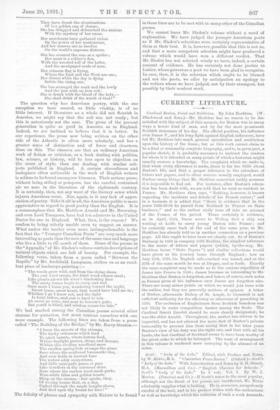CURRENT LITERATURE.
Cardinal Beaton, Priest and Politician. By John Horkless. (W. Blackwood and Sons.)—Mr. Horkless has no reason to be dis- satisfied with the subject of this memoir, for Beaton was in many ways a heroic kind of man, and by far the most prominent Scottish statesman of his day. His official position, his influence over James V., and his long fight against English influences, have led Mr. Herkless into much general speculation and meditation upon the history of the times ; but as this work cannot claim to be a final or reasonably complete biography, and is, in groat part, a popular sketch, it is probably necessary to instruct the readers for whom it is intended on many points of which a historian might usually assume a knowledge. The complaint which we make is, that when every allowance is made, there is far too little about Beaton's life, and that a proper reference to the calendars of letters and. papers, and. to other sources usually employed, would. disclose many things that Mr. Herkless somewhat rashly assumes it is impossible to find out. For instance, after Beaton's educa- tion has been dealt with, we are told that he went as resident to France. Mr. Herkless then says, "Nothing, however, is known regarding the incidents and details of his French career ;" and in a footnote it is added that "there is evidence that in the years 1522-23-24 he passed from Scotland to France on State business ;" and so the author airily runs off into an account of the France of the period. There certainly is evidence, as in April, 1524, Deere wrote to Wolsoy that a ship was waiting at Leith to carry young Beaton into France; and he certainly came back at the end of the same year, as Mr. Herkless has already told. us in another connection on a previous page. All this ought to have boon sot clearly out. So of Beaton's Embassy in 1553 in company with Erskine, the simplest reference to the series of letters and papers (which, by-the-way, Mr. Herkless terms " State Papers ") and similar collections would have given us his journey home through England. ; how on July 12th, 1533, his English safe-conduct was issued, and on the 27th of the same month he was at Dieppe, and so forth. Exactly the same complaint may be made as to the curious expedition of James into France in 1535; James becomes so interesting to Mr. Herkless that Beaton is forgotten, and hence, of course, such notes as Faenza gives of his influence over James are forgotten also. There are many minor points on which we would join issue with the author, but they are generally matters of opinion. A letter of Barlow, afterwards Bishop of St. Asaph, to Cromwell is not sufficient authority for the efficiency or otherwise of preaching in 1535. The exclusion of Englishmen from Scottish benefices was not likely to make competition keener among the Scots, The Cardinal Sancti Eueebii should be more clearly designated; he was the elder Accolti. Throughout, the author has striven to be impartial, and has not allowed the more fact of Beaton's private immorality to prevent him from seeing that in his later years Beaton's view of his duty was the right one, and that with all his faults, the last Cardinal of Scotland seems to have been worthy of the great order to which he belonged. The want of arrangement in this volume is rendered more annoying by the absence of an index.


































 Previous page
Previous page